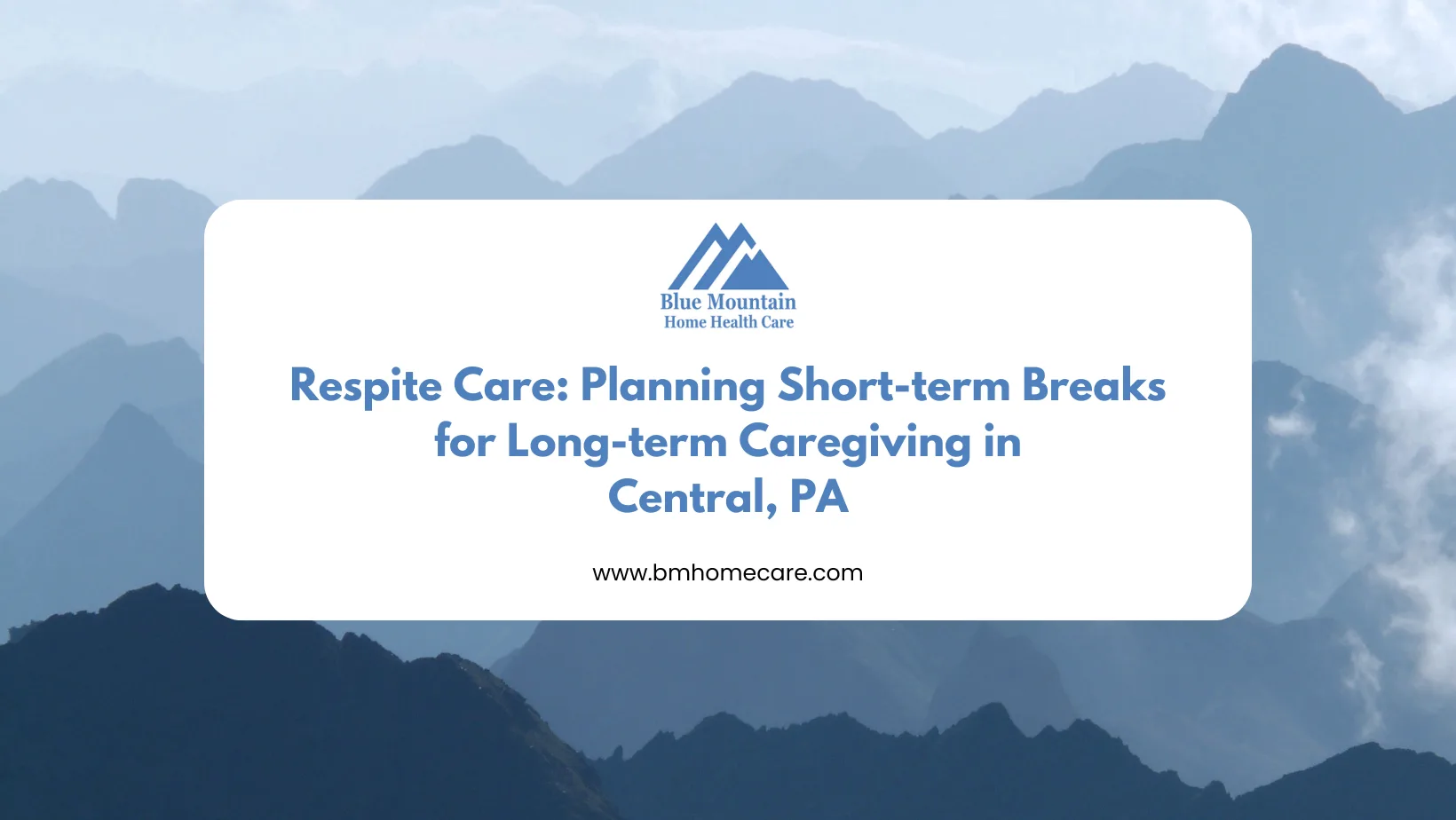Caregiving for a loved one can be one of the most rewarding experiences, but it can also be incredibly demanding and emotionally taxing. As a caregiver, it’s essential to prioritize your own well-being and take regular breaks to prevent burnout and maintain your ability to provide quality care. In Central, PA, respite care services, like those offered by Blue Mountain Home Care, can provide the support you need to plan short-term breaks and sustain your long-term caregiving journey.
Understanding Respite Care
Respite care is a type of short-term care designed to give primary caregivers a break from their caregiving responsibilities. It can be provided in a variety of settings, including the care recipient’s home, an adult day care center, or a residential care facility. Respite care services can range from a few hours a week to several days or weeks at a time, depending on the needs of the caregiver and the care recipient.
The goal of respite care is to provide caregivers with the opportunity to rest, recharge, and attend to their own needs, while ensuring that their loved one receives high-quality care in their absence. This can include assistance with daily living activities, medication management, companionship, and more.
The Importance of Planning Short-Term Breaks
When you’re immersed in the daily responsibilities of caregiving, it can be easy to overlook the importance of taking breaks. However, planning regular short-term breaks is crucial for maintaining your physical, emotional, and mental well-being. Some of the key benefits of taking respite breaks include:
- Preventing Burnout
Caregiving can be physically and emotionally exhausting, and without regular breaks, caregivers are at a high risk of experiencing burnout. Burnout can lead to feelings of exhaustion, frustration, and resentment, which can negatively impact the quality of care provided. By taking short-term breaks, caregivers can recharge their batteries and return to their responsibilities with renewed energy and patience.
- Maintaining Personal Health and Well-Being
Caregiving can often lead to neglecting one’s own health and well-being. Caregivers may skip their own medical appointments, forgo exercise and social activities, and experience increased stress and anxiety. Planning short-term breaks allows caregivers to focus on their own physical and mental health, attend to personal needs, and engage in activities that bring them joy and relaxation.
- Enhancing the Quality of Care
When caregivers are well-rested and emotionally recharged, they are better equipped to provide high-quality care to their loved ones. Short-term breaks can help caregivers return to their responsibilities with renewed patience, compassion, and energy, leading to better care outcomes and a more positive caregiving experience.
- Strengthening Family Relationships
Caregiving can sometimes strain family relationships, particularly if one family member is bearing the brunt of the responsibilities. Planning short-term breaks can provide opportunities for other family members to get involved in the caregiving process, fostering a sense of teamwork and shared responsibility. This can lead to improved communication, understanding, and overall family dynamics.
Planning Your Respite Care Break
When planning a respite care break, it’s important to consider your specific needs and the needs of your loved one. Some key steps in the planning process include:
- Assessing Your Needs
Consider the length and frequency of the break you need to feel refreshed and recharged. This may depend on factors such as the intensity of your caregiving responsibilities, your own health and well-being, and the availability of other support systems.
- Exploring Respite Care Options
Research the respite care options available in your area, such as in-home care, adult day care, or short-term residential care. Consider factors such as the type of care provided, the qualifications of the caregivers, and the cost and financing options available.
- Communicating with Your Loved One
Discuss your plans for respite care with your loved one, if possible. Explain the benefits of taking a break and reassure them that they will be in good hands during your absence. If your loved one has cognitive impairments, work with their healthcare provider to develop a communication strategy that minimizes confusion and anxiety.
- Preparing for the Transition
Provide the respite care provider with detailed information about your loved one’s needs, preferences, and daily routines. This may include medication schedules, dietary requirements, favorite activities, and any specific care instructions. Ensure that your loved one has all necessary supplies and equipment for the duration of the respite period.
- Utilizing Your Break
Make the most of your respite break by focusing on activities that promote your own well-being and relaxation. This may include catching up on sleep, engaging in hobbies or exercise, spending time with friends and family, or simply enjoying some quiet time alone. Remember, the goal of respite care is to help you recharge and return to your caregiving responsibilities with renewed energy and perspective.
Choosing the Right Respite Care Provider
When selecting a respite care provider, it’s essential to choose an agency that you can trust to provide high-quality, compassionate care for your loved one. At Blue Mountain Home Care, we understand the unique challenges and needs of caregivers in Central, PA, and we are committed to providing the support and relief you need to sustain your long-term caregiving journey.
Our team of experienced, trained caregivers is dedicated to delivering personalized care that meets the unique needs of each client. We work closely with families to develop individualized respite care plans that ensure a smooth transition and continuity of care during the respite period.
In addition to our high-quality care services, we also offer support and resources for family caregivers, including caregiver support groups, educational workshops, and referrals to local resources. We understand the challenges of caregiving and are here to support you every step of the way.
If you’re a caregiver in Central, PA, and could benefit from respite care services to plan short-term breaks, we encourage you to reach out to Blue Mountain Home Care. Our team is here to answer your questions, provide guidance, and help you arrange the care and support you need to maintain your well-being and continue providing the best possible care for your loved one.
Remember, taking care of yourself is not a luxury – it’s a necessity. By prioritizing your own well-being and utilizing respite care services, you can sustain your long-term caregiving journey with strength, resilience, and compassion.

